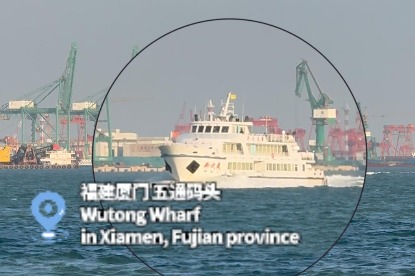Washington's fixation with Iran takes another turn for the worse: China Daily editorial
chinadaily.com.cn | Updated: 2019-04-09 20:41

Viewed independently, Washington's announced intent to designate Iran's Islamic Revolutionary Guard Corps a foreign terrorist organization may seem to be little more than symbolic.
After all, its Specially Designated Global Terrorist list already blacklists the IRGC and penalizes business dealings with it.
Yet it goes far beyond being just symbolic, as the move marks the first time the United States has officially labeled another country's military, or part of its government, a terrorist group, showing once again that it prefers to see itself as fundamentally above others.
Iran's Deputy Foreign Minister Abbas Araqchi has called the designation "a major strategic mistake". Which it is. The designation is an unsurprising follow-up to the US' withdrawal from the Iran nuclear deal, which was in itself an outcome of the current US administration's faith in "maximum pressure". But things may not go the way it anticipates.
Instead, this may end up becoming another US blunder with far-reaching negative geopolitical consequences. The Supreme National Security Council in Teheran has responded to Washington's move in kind, designating the US military as a "terrorist organization", and the IRGC commander has warned the US military will lose the security it has enjoyed in the Middle East.
"The US military bases and their military forces in the region will be considered terrorist bases and terrorist forces that will be dealt with and confronted accordingly," Araqchi said. It remains to be seen exactly what will happen hereafter. But the consequences would indeed be grave should the verbal hostility translate into real-world confrontation. The biggest flaw in the US designation, like its withdrawal from the nuclear deal, lies in its lack of legitimacy.
All other signatories to the deal, which was endorsed unanimously by the United Nations Security Council, remain committed to it. Washington's claims of Iranian violations, on the other hand, have not been supported by the results of UN-led inspections. Despite Washington's allegations that the IRGC has sponsored and engaged in acts of terror, there is little chance governments of other countries, not to mention the UN, will follow suit and make the same designation.
In the end, Washington's latest move will do little than further escalate tensions with Teheran, and deteriorate the security conditions for US interests in the Middle East. The only real beneficiary may be hard-line Israeli Prime Minister Benjamin Netanyahu, who is seeking re-election, and has thanked the US president for meeting another of his "important requests".
The White House has declared the disputed city of Jerusalem Israel's capital, and recognized Israeli sovereignty over the occupied Golan Heights. Which has inspired Netanyahu to consider practicing "sovereignty" over the occupied territories of the West Bank.
But the fundamental problem underlying all these is there is no legal standing for any of them. Its outlaw behavior not only disqualifies Washington as a mediator between the Israelis and Palestinians, but also undermines US and Israeli national security in the long term, and, more importantly, further destabilize the Middle East.
























